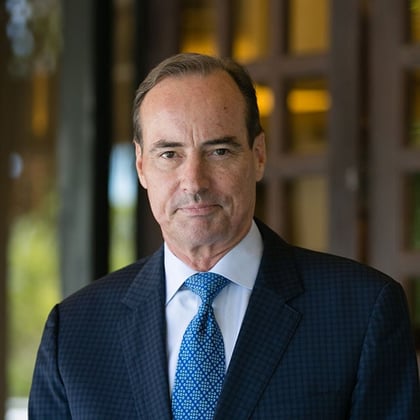Here’s advice for financial advisors from “The Contrarian’s Contrarian,” Harry Dent Jr.:
In the unprecedented market crash that he foresees to hit this year, which will send stocks plummeting as much as 90%, refrain from routinely telling clients to stay the course and rebalance.
“That won’t work. The market is just going to keep going down. Richer people are going to lose the most. People will lose money, and … financial advisors are going to need bodyguards to keep their clients from shooting them,” Dent tells ThinkAdvisor in an interview.
The strategist and newsletter publisher has been predicting a humongous wide-reaching global crash for some time now.
Indeed, we’ve been in “a first crash” for the last two months, he argues. By the end of March, the market could be down “30%-40% or more,” he says.
That would mean that “the greatest bubble of all financial asset classes,” including gold, has burst, insists Dent.
But wait — midyear is when “the fireworks” really kick off, igniting “the biggest crash in a lifetime,” he predicts. Stocks will dive as much as 90%.
The U.S. economy has already lost its mojo, Dent maintains. He says a recession has just begun.
“It’s a necessary evil,” he notes, contending that recessions are a good thing — “a deep cleansing” that “clears the decks for the next boom.”
Dent is nothing if not controversial when it comes to his forecasts, which are largely based on demographics.
He correctly predicted Japan’s 1989 bubble bust and recession, the dotcom crash and the populist wave that brought Donald Trump his U.S. presidency.
Other of Dent’s prognostications, however, haven’t materialized; and his critics refuse to overlook that.
Dent, who has an MBA from Harvard Business School, owns HSD Publishing, an independent research firm that puts out monthly newsletters that he and Rodney Johnson, the firm’s president, each write.
A free daily newsletter is also made available.
In the interview, Dent predicts just when the stock market will bottom, when inflation will be tamed, how the dollar and gold will fare and what advisors should be telling clients to prepare for the big slide he forecasts.
A crypto enthusiast, he predicts that “Bitcoin is probably going to become the new monetary gold standard of the world.” Then he reveals his buying plans.
ThinkAdvisor held a phone interview with Dent, speaking from his base in San Juan, Puerto Rico, on March 8.
In his advice to advisors, he raised the issue of a retirement planning trend that disturbs him and indicated how FAs can effectively turn it around, if not eliminate it.
Here are highlights of our conversation:
THINKADVISOR: Will [Russian president Vladimir] Putin’s war against Ukraine cause the huge market crash that you’ve been predicting?
HARRY DENT JR.: Putin is just a trigger. So is inflation. They’re only symptoms. The cause will be the biggest bubble in history, and bubbles do only one thing: Burst.
The biggest issue is that we have the greatest stock market and financial asset bubbles in everything that people invest in, including gold.
But what effect will Russia’s invasion of Ukraine have on the market?
Putin’s [war] will end up revealing the weakness in the market if it ends up being a 30% to 50% crash near-term instead of a 10%-20% correction that happens fairly often.
Talk more about a near-term crash. When could that happen?
We’re just two months into this first crash now. Probably by the end of March, we could be down about 30% or 40% or more.
That would say to me that the bubble has burst.
The U.S. government created this damn bubble just to keep from having a few recessions and politicians taking a little blow here and there.
When is the huge, longer-term crash coming, then?
Maybe April into June. By midyear, the fireworks ought to go off on the downside. If not, I’m just going to have to shut up.
How bad will that crash be?
It will be the biggest crash in our lifetime. Stocks will go down 89%-90%. It will be global. Stocks and financial assets — particularly real estate — won’t come back next year, not in two years, not in five years — not for decades.
This is a different thing from the corrections we’ve had in the boom.
How will the crash impact the U.S. economy?
You’ll see about half of financial assets go down: Stocks will go down the most, then risky bonds, real estate, then less risky bonds and so on.
When people lose assets, they certainly slow their spending because they get more cautious.
When you’ve lost that much in assets, and people who have, for example, $600,000 saved up for retirement are getting close to that age, they say, “Holy crap, I’d better cut back. Forget that boat I was thinking of buying!”
Do you see a recession coming?
It has started right about now. March and April are moving into a recession. You have to allow recessions to clean up the messes.
[The government] is killing free-market capitalism because they don’t want to have a recession and clean out bad debts. They’ve been printing money for 13 years.
But the economy died between 2008 and now. You need to bury it and get on.
There are more zombie companies than ever because we didn’t let ourselves have a damn recession. They printed more money in just [the last] two years than in the 12 years before that!
They’re printing more and more to keep this bubble going. They’re printing more money to keep the economy growing not at 4% or 5%, but at [only] 2% on average!
The government created the biggest financial asset bubble of all asset classes, even gold.
Most people dread recessions. Why is it good to have them?
Recessions clean out the economy very effectively and efficiently so you can clear the decks to have a new boom.
You can’t have a boom without a bust. A recession is a deep cleansing. Cleansings are good. Recessions are the opposite of booms, and they are equally necessary.
This is a necessary evil. It will be painful; but if we don’t go through this permanent reset of the greatest financial bubble in history and back to normal, companies will have to fail and debts will have to fail.
What then?
The millennials will inherit this endless debt and never see an economy that’s growing at 3% or 4% again.
When will the stock market bottom out?
Likely in 2023, early 2024. In a bubble crash like this, we expect the S&P, the Dow and Nasdaq to be down 80%-90%.
It should take about two years, maybe more, when it’s time to buy. But we won’t come out of it as strong as we did in past major downturns because the millennial generation isn’t that strong.








 March 11, 2022 at 02:38 PM
March 11, 2022 at 02:38 PM










 Copyright © 2024 ALM Global, LLC. All Rights Reserved.
Copyright © 2024 ALM Global, LLC. All Rights Reserved.